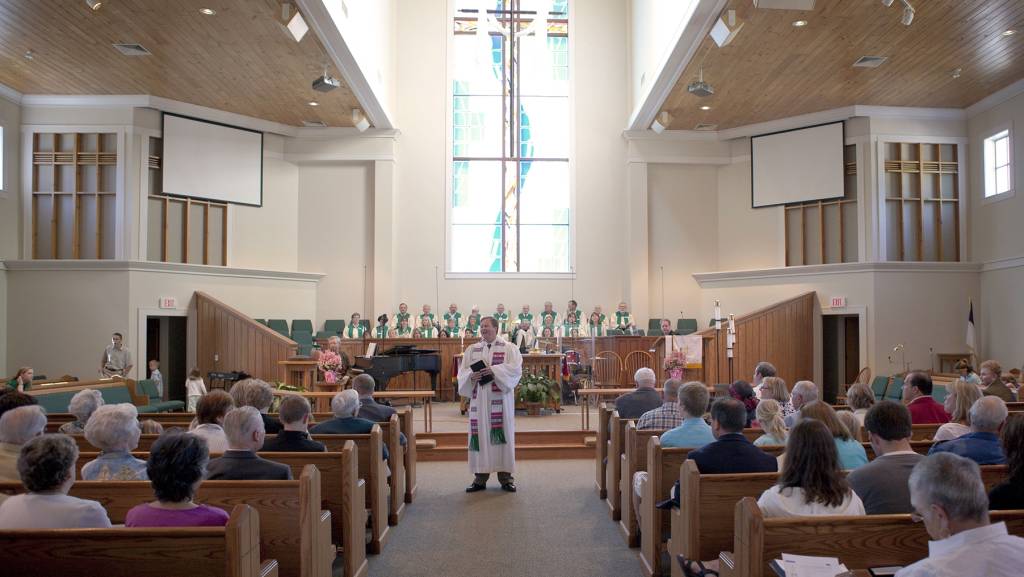Challenge
The church must reverse trends of long hours and constant stress, so that clergy have the space to tend to their well-being.
The church must reverse trends of long hours and constant stress, so that clergy have the space to tend to their well-being.
The Duke Endowment invested in the Clergy Health Initiative in 2007 with a $12 million grant to Duke Divinity School.
The initiative creates, pilot tests, and rigorously evaluates well-being programs tailored to clergy, with the goal of sustaining long-term, positive behavior change.
The Clergy Health Initiative reports that the roles and actions of many people within the church have a bearing on clergy health.
Studies indicate that clergy are in one of the nation’s most overworked professions. The long hours and constant stress of the job weigh on their health leaving little time for pastors to take care of themselves. Research indicates that clergy regularly overextend themselves, neglect their bodies and fail to notice physical signals of distress, and ruminate on criticism that isn’t relevant to God’s call.
The challenge for the church is to reverse the trends at work in the faith community, so that clergy have the space to attend to their well-being.

The Duke Endowment invested in the Clergy Health Initiative in 2007 with a $12 million grant to Duke Divinity School. The Divinity School collaborated with the Western North Carolina Conference and the North Carolina Conference of the United Methodist Church to implement the project.
Project: Stress reduction program
What’s Next: Workshops are underway
Project: Statewide longitudinal survey
What’s Next: The next survey will be sent in fall of 2021
Project: Reflections study
What’s Next: Processing data in order to develop recommendations to Duke Divinity School and United Methodist conferences for nurturing clergy
Project: Develop field guide of best practices
What’s Next: Develop and disseminate evidence-based programing to promote clergy well-being
Drawing on findings across its studies, the Clergy Health Initiative creates, pilot tests and rigorously evaluates well-being programs tailored to clergy, with the goal of sustaining long-term, positive behavior change. The targets of the suite of programs to date are metabolic disorders and chronic stress.
The Clergy Health Initiative reports that the roles and actions of many people within the church have a bearing on clergy health. For example…
Cultivate friendships that provide emotional support. Clergy often have access to instrumental support (for example, someone who will bring them a meal). It’s often harder to find emotional support, in which a pastor can talk about difficult emotions and receive active listening, with or without advice; however, seeking out these friendships can make a big difference.
Express their caring for their pastor as a person. Ask your pastor about his or her family, vacation or health — anything that shows that you care about them as an individual, not just as a spiritual leader.
Try to make the pastor’s life more predictable. There are true emergencies that need a pastor’s immediate attention, and your pastor will want to be there for you. There may be times, though, when the situation can wait. Find out what day your pastor takes off and try to avoid calling on that day or during dinner hours.
Address church climates that are consistently negative toward pastors. Churches are comprised of people, and even well-intentioned people can interact in such a way as to create an environment that is hostile to pastors. Excessive demands and criticism are very strongly related to depression, anxiety and burnout among pastors.
Like many people serving in professions in which they feel “called,” clergy are not immune to stress and burnout. The Duke Endowment partnered with the Duke Clergy Health Initiative to study the acceptability, feasibility and effectiveness of stress management tools with the goal of identifying practices that would allow clergy in the North Carolina United Methodist (UMC) conferences, and beyond, to live more fully into the sacred work of ministry. The Selah Stress Management project engaged nearly 300 UMC clergy from across the state to rigorously test three separate stress management practices. As outlined in the report, the findings demonstrate these practices are proven to reduce stress and anxiety and improve physiological responses to stress.
This report presents findings on the well-being of United Methodist clergy ages 55 and older, and the well-being of clergy retired 4 years or fewer.
Evaluating intervention components of a program to improve clergy health.
This study uses recent data from United Methodist Church clergy in North Carolina to test extant depictions of rural ministry, which typically portray rural churches as challenging occupational settings.
Ninety-five percent of all actively-serving United Methodist clergy in North Carolina (NC) completed self-report height and weight items and diagnosis questions from the Behavioral Risk Factor Surveillance Survey (BRFSS).

July 23, 2025 | Kristen Richardson-Frick, Mebane Rash and Hannah Vinueza McClellan